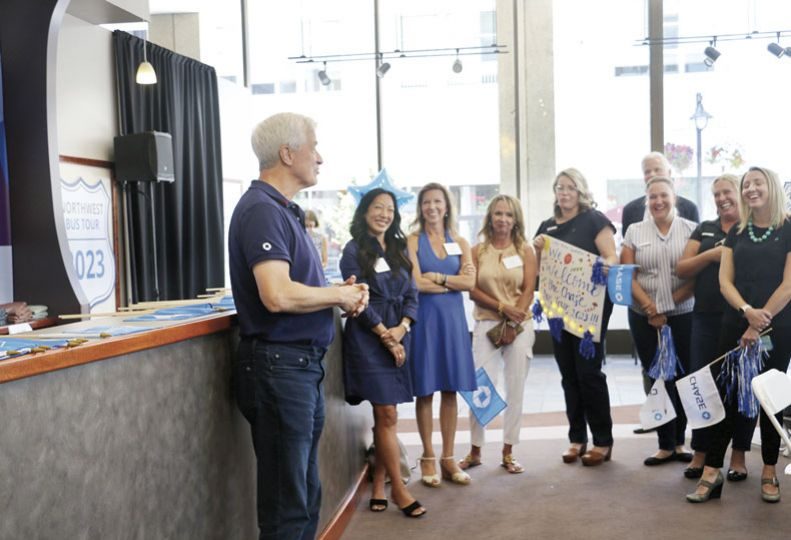
Home » JPMorgan Chase plans to grow in Spokane, Jamie Dimon says
JPMorgan Chase plans to grow in Spokane, Jamie Dimon says
CEO makes first visit to Lilac City in one leg of West Coast tour

August 17, 2023
As Spokane grows, JPMorgan Chase & Co., plans to grow with it, according to Jamie Dimon, chairman and CEO of JPMorgan Chase & Co., and one of the leading voices for the financial industry.
Dimon arrived in downtown Spokane last month to kick off his West Coast tour of the financial institution’s branches and was met by a crowd of employees with homemade posterboards and pompoms welcoming the nationally known business executive.
It was the first time Dimon visited Lilac City since JPMorgan Chase took over Washington Mutual Bank operations in 2008. In the lobby of the bank’s downtown branch at 601 W. Main, employees cheered and called for the expansion of the financial institution’s operations.
While some other national banks have been reducing their physical presence in the regional market, JPMorgan Chase plans to grow its operations in the Inland Northwest, Dimon says.
“Almost every market we’re in, there is a plan to grow in multiple ways: branches, bankers, products, services,” says Dimon.
Dimon has over 35 years of experience in the financial services sector, including president and CEO of The Travelers Cos., and president of Citigroup, Inc. He became CEO of JPMorgan Chase in 2006 and chairman a year later. According to Forbes Magazine, the bank’s acquisition of failed First Republic Bank and an influx of deposits from clients fleeing to larger institutions has made it the top bank in the world with a total of $3.7 trillion in deposits.
Currently, JPMorgan Chase has 11 branches in the Spokane-Coeur d’Alene area with plans to expand over time, says Dimon, yet the financial institution doesn’t have any active projects or imminent plans.
In addition, Spokane now has a middle-market banker on site, after having been managed from the bank’s Seattle offices.
He points to Spokane’s health care industry as a possible growth area that could benefit from the bank’s expertise.
JPMorgan Chase is also a correspondent bank, which provides services to other financial institutions such as funds transfers, check clearing, and settlements. JPMorgan Chase is the correspondent bank for 17 of Washington’s regional, midsize, and community banks.
In Spokane, it provides banking services for Gonzaga University and is the commercial card provider for Community Colleges of Spokane and Washington State University.
“No one’s got to worry about JPMorgan,” he says. “No matter what happens, hard landings, soft landings, we will be here.”
As previously reported by the Journal, more than 300 Pacific Northwest branches of Seattle-based Washington Mutual Bank became JPMorgan Chase bank branches in June 2009, nearly a year following WaMu’s bank failure amid the 2008 collapse of the housing and mortgage markets that lead to a worldwide financial crisis. At the time, Spokane had 12 WaMu branches, with an additional seven in the greater Spokane-Coeur d’Alene area.
Today New York City-based JPMorgan Chase operates nearly 160 branches and over 300 ATMs across the state.
For the second quarter of 2023, JPMorgan Chase reported net income of $14.5 billion, an increase from year-earlier net income of $8.6 billion. The net income includes $1.8 billion from the bank’s acquisition of First Republic Bank, which JPMorgan Chase purchased in May after the San Francisco-based bank failed.
Full-year net income in 2022 totaled $37.7 billion, down from $48.3 billion in 2021.
The bank reported total assets of $3.7 trillion as of Dec. 31, 2022.
According to the Journal’s banks list, local deposits totaled $1.22 billion as of Dec. 31.
The WaMu acquisition in 2008 was JPMorgan Chase’s entry into the Washington market.
As part of the bank’s efforts to transition into the community, the financial services company hired former Spokane banker Phyllis Campbell as its chairman for the Pacific Northwest market. Campbell was charged with leading the transition from WaMu to JPMorgan Chase. She retired from that role in April.
Dimon says one of the reasons he hired Campbell was he wanted JPMorgan Chase to become a part of the community, the way WaMu had been a hometown bank for many residents.
“We promised the community … that over time we would be a great citizen, and that over time we’d add consumer branches, business banking, private banking, commercial banking, and philanthropy,” he says.
During his inaugural visit, Dimon acknowledged the work and service that regional banks and credit unions provide in Spokane and says that, while JPMorgan Chase wants to expand its presence in the region, the financial institution’s desire to gain market share is healthy competition.
JPMorgan Chase moves $10 trillion a day and serves some of the largest financial institutions in the world, says Dimon. There are tools and services that JPMorgan Chase can provide that others can’t, he says.
“I’m in a business where competing and collaborating happens all the time with the same people,” says Dimon. “Competition is a helpful thing to the country.”
Dimon also addressed topics that are influencing the economy and businesspeople, including interest rates, and the impacts of high vacancies in commercial real estate properties across the country.
While Dimon isn’t predicting the U.S. will fall into a recession, he says people should be concerned about the effect of higher interest rates.
“I don’t know if we’re going to have a soft landing or a hard landing,” says Dimon. “As a businessperson, I’m prepared for all of them. I do think people may be surprised about rates having to stay higher for longer.”
Before departing, the business executive clad in a polo shirt and jeans dispelled any rumors that he may run for political office.
“I have no intention,” he says. “I love my job.”
Latest News Special Report Banking & Finance
Related Articles
Related Products





